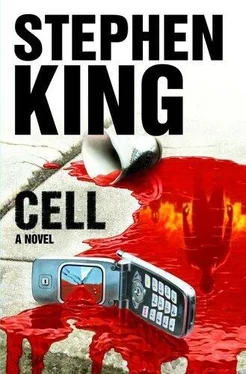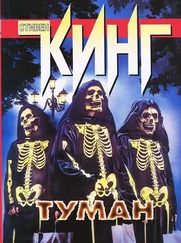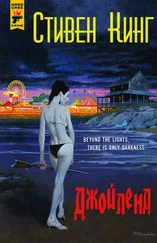"Get under cover," Officer Ashland repeated, and trotted to the Four Seasons side of the street. Clay wished he could have repeated the thing about the cell phones, but on the whole he was just glad to see the cop out of harm's way. Not that he believed anyone in Boston really was, not this afternoon.
4
" What are you doing?" Clay asked Tom McCourt. "Don't touch him, he might be, I don't know, contagious."
"I'm not going to touch him," Tom said, "but I need my shoe."
The shoe, lying near the splayed fingers of the lunatic's left hand, was at least away from the exit-spray of blood. Tom hooked his fingers delicately into the back and pulled it to him. Then he sat down on the curb of Boylston Street—right where the Mister Softee truck had been parked in what now seemed to Clay like another lifetime—and slipped his foot into it. "The laces are broken," he said. "That damn nutball broke the laces." And he started crying again.
"Do the best you can," Clay said. He began working the butcher knife out of the portfolio. It had been slammed through with tremendous force, and he found he had to wiggle it up and down to free it. It came out reluctantly, in a series of jerks, and with ugly scraping sounds that made him want to cringe. He kept wondering who inside had gotten the worst of it. That was stupid, nothing but shock-think, but he couldn't help it. "Can't you tie it down close to the bottom?"
"Yeah, I think s—"
Clay had been hearing a mechanical mosquito whine that now grew to an approaching drone. Tom craned up from his place on the curb. Clay turned around. The little caravan of BPD cars pulling away from the Four Seasons halted in front of Citylights and the crashed Duck Boat with their gumballs flashing. Cops leaned out the windows as a private plane—something midsize, maybe a Cessna or the kind they called a Twin Bonanza, Clay didn't really know planes—came cruising slowly over the buildings between Boston Harbor and the Boston Common, dropping fast. The plane banked drunkenly over the park, its lower wing almost brushing the top of one autumn-bright tree, then settled into the canyon of Charles Street, as if the pilot had decided that was a runway. Then, less than twenty feet above the ground, it tilted left and the wing on that side struck the faзade of a gray stone building, maybe a bank, on the corner of Charles and Beacon. Any sense that the plane was moving slowly, almost gliding, departed in that instant. It spun around on the caught wing as savagely as a tetherball nearing the end of its rope, slammed into the redbrick building standing next to the bank, and disappeared in bright petals of red-orange fire. The shockwave hammered across the park. Ducks took wing before it.
Clay looked down and saw he was holding the butcher knife in his hand. He had pulled it free while he and Tom McCourt were watching the plane crash. He wiped it first one way and then the other on the front of his shirt, taking pains not to cut himself (now his hands were shaking). Then he slipped it—very carefully—into his belt, all the way down to the handle. As he did this, one of his early comic-book efforts occurred to him . . . a bit of juvenilia, actually.
"Joxer the Pirate stands here at your service, my pretty one," he murmured.
"What?" Tom asked. He was now beside Clay, staring at the boiling inferno of the airplane on the far side of Boston Common. Only the tail stuck out of the fire. On it Clay could read the number LN6409B. above it was what looked like some sports team's logo.
Then that was gone, too.
He could feel the first waves of heat begin to pump gently against his face.
"Nothing," he told the little man in the tweed suit. "Leave us boogie."
"Huh?"
"Let's get out of here."
"Oh. Okay."
Clay started to walk along the southern side of the Common, in the direction he'd been heading at three o'clock, eighteen minutes and an eternity ago. Tom McCourt hurried to keep up. He really was a very short man. "Tell me," he said, "do you often talk nonsense?"
"Sure," Clay said. "Just ask my wife."
5
" Where are we going?" Tom asked. "I was headed for the T." He pointed to a green-painted kiosk about a block ahead. A small crowd of people were milling there. "Now I'm not sure being underground is such a hot idea."
"Me, either," Clay said. "I've got a room at a place called the Atlantic Avenue Inn, about five blocks further up."
Tom brightened. "I think I know it. On Louden, actually, just off Atlantic."
"Right. Let's go there. We can check the TV And I want to call my wife."
"On the room phone."
"The room phone, check. I don't even have a cell phone."
"I have one, but I left it home. It's broken. Rafe—my cat—knocked it off the counter. I was meaning to buy a new one this very day, but. . . listen. Mr. Riddell—"
"Clay."
"Clay, then. Are you sure the phone in your room will be safe?"
Clay stopped. He hadn't even considered this idea. But if the landlines weren't okay, what would be? He was about to say this to Tom when a sudden brawl broke out at the T station up ahead. There were cries of panic, screams, and more of that wild babbling—he recognized it for what it was now, the signature scribble of madness. The little knot of people that had been milling around the gray stone pillbox and the steps going below-ground broke up. A few of them ran into the street, two with their arms around each other, snatching looks back over their shoulders as they went. More—most—ran into the park, all in different directions, which sort of broke Clay's heart. He felt better somehow about the two with their arms around each other.
Still at the T station and on their feet were two men and two women.
Clay was pretty sure it was they who had emerged from the station and driven off the rest. As Clay and Tom stood watching from half a block away, these remaining four fell to fighting with each other. This brawl had the hysterical, killing viciousness he had already seen, but no discernible pattern. It wasn't three against one, or two against two, and it certainly wasn't the boys against the girls; in fact, one of the "girls" was a woman who looked to be in her middle sixties, with a stocky body and a no-nonsense haircut that made Clay think of several women teachers he'd known who were nearing retirement.
They fought with feet and fists and nails and teeth, grunting and shouting and circling the bodies of maybe half a dozen people who had already been knocked unconscious, or perhaps killed. One of the men stumbled over an outstretched leg and went to his knees. The younger of the two women dropped on top of him. The man on his knees swept something up from the pavement at the head of the stairs—Clay saw with no surprise whatever that it was a cell phone—and slammed it into the side of the woman's face. The cell phone shattered, tearing the woman's cheek open and showering a freshet of blood onto the shoulder of her light jacket, but her scream was of rage rather than pain. She grabbed the kneeling man's ears like a pair of jughandles, dropped her own knees into his lap, and shoved him backwards into the gloom of the T's stairwell. They went out of sight locked together and thrashing like cats in heat.
"Come on," Tom murmured, twitching Clay's shirt with an odd delicacy. "Come on. Other side of the street. Come on."
Clay allowed himself to be led across Boylston Street. He assumed that either Tom McCourt was watching where they were going or he was lucky, because they got to the other side okay. They stopped again in front of Colonial Books (Best of the Old, Best of the New), watching as the unlikely victor of the T station battle went striding into the park in the direction of the burning plane, with blood dripping onto her collar from the ends of her zero-tolerance gray hair. Clay wasn't a bit surprised that the last one standing had turned out to be the lady who looked like a librarian or Latin teacher a year or two away from a gold watch. He had taught with his share of such ladies, and the ones who made it to that age were, more often than not, next door to indestructible.
Читать дальше








